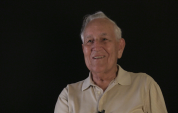4:49 | After the war, former POW Jim Wicker opted to remain in the Air Force and took his bride to a new overseas post in Japan. After that, he served in a variety of ground jobs and finished his career back in the pilot's seat, flying for the Strategic Air Command.
Keywords : Jim Wicker pilot photo-reconnaissance Warner Robins GA Robins Air Force Base Japan Korea Strategic Air Command (SAC)

He had qualified as an aircraft mechanic in the Army Air Corps, but Jim Wicker jumped at the chance for pilot training. He aced a test for those with no college and began flight school. It was a proud day for him when he graduated because he thought he had no chance to become a pilot.
He was very satisfied to be a fighter pilot in training, but as he waited for gunnery school, Jim Wicker was moved into photo reconnaissance. There was more emphasis being put on intelligence and more pilots were needed. He went right into action in the run up to D-Day and on the afternoon of the 6th, the low clouds caused a very bad day for him.
When he had to bail out, Jim Wicker was literally sucked from the cockpit when he released the canopy because of his high rate of speed. He was just a hundred miles inland a few days after D-Day and the Germans caught him almost immediately. As he sat in solitary confinement waiting for interrogation, he was comforted by his faith.
The interrogator was cordial and not at all threatening. Jim Wicker had been shot down over France and was amazed at the information the Germans already possessed. It only lasted an hour and he was off to a prison camp, but he was curious about the man and it turned out that he had a very interesting story that continued after the war.
When you got to your prison camp, you weren't immediately accepted by those POW's already there because the Germans planted spies in the camp. Jim Wicker was fortunate to find a friend from his hometown, so he was welcomed in. He was in Stalag Luft III, where the famous "Great Escape" had occurred.
They had a secret radio in the prison camp, so they could contrast the BBC with the German newscasts. Jim Wicker recalls how the news of the approach of the Russians caused their captors to take all the POW's out on the road to march further into Germany. The conditions were terrible at the end of that march when the men were packed into a camp meant for far fewer prisoners.
Their German guards were scared of the SS and terrified of being sent to the Russian front, recalls Jim Wicker, a downed American pilot. The war had reached their homeland and Patton soon reached the prison camp where he was interred. He was liberated.